Voltaire
François-Marie Arouet
(21 November 1694 – 30 May 1778)
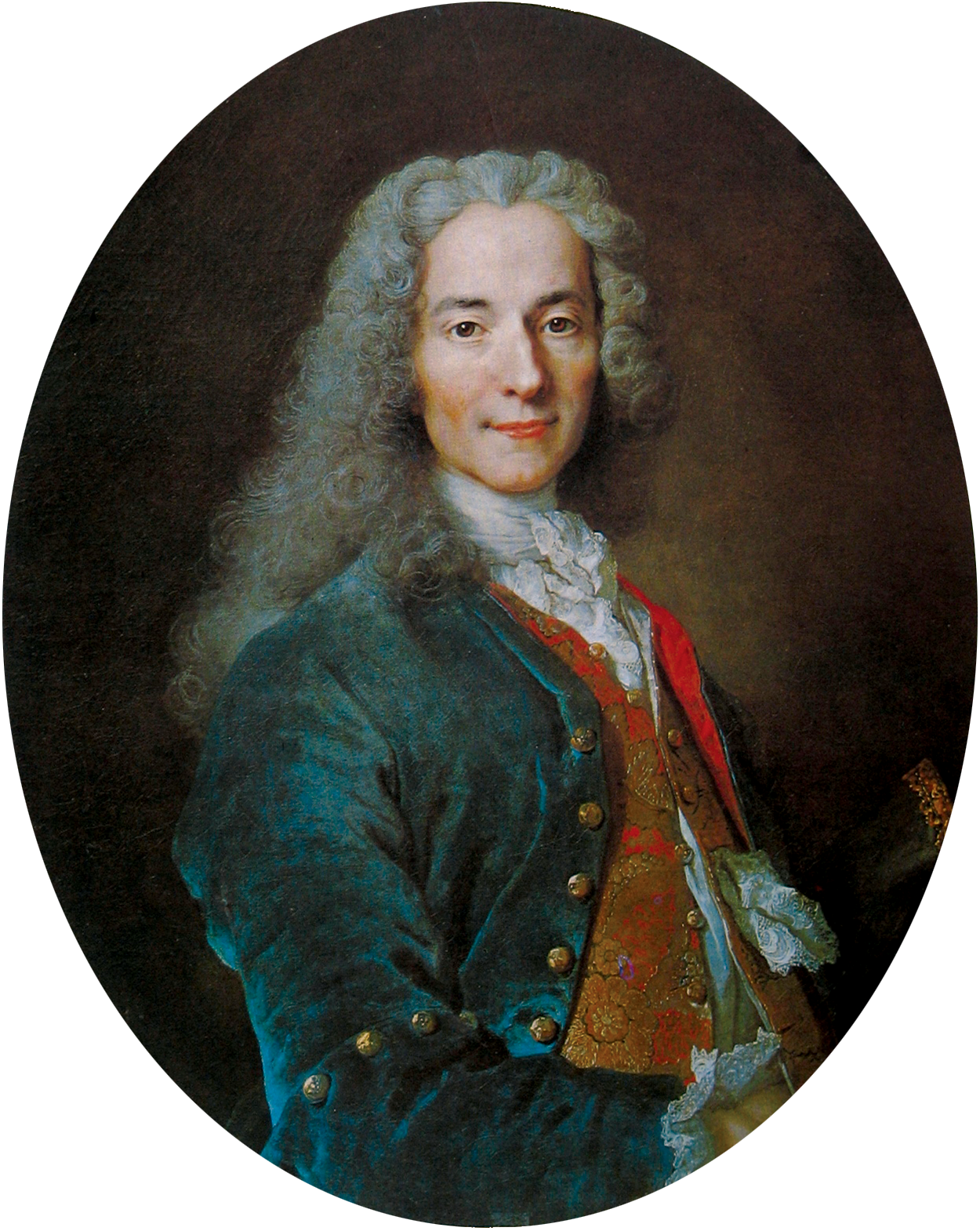
François-Marie Arouet
(21 November 1694 – 30 May 1778)

François-Marie Arouet known by his nom de plume Voltaire, was a French Enlightenment writer, historian and philosopher famous for his wit, his attacks on Christianity as a whole, especially the established Catholic Church, and his advocacy of freedom of religion, freedom of speech and separation of church and state.
Voltaire was a versatile and prolific writer, producing works in
almost every literary form, including plays, poems, novels, essays and
historical and scientific works. He wrote more than 20,000 letters and
more than 2,000 books and pamphlets.
He was an outspoken advocate of civil liberties, despite the risk this
placed him in under the strict censorship laws of the time. As a satirical polemicist, he frequently made use of his works to criticize intolerance, religious dogma and the French institutions of his day.
By the time he left school, Voltaire had decided he wanted to be a
writer, against the wishes of his father, who wanted him to become a
lawyer.
Voltaire, pretending to work in Paris as an assistant to a notary,
spent much of his time writing poetry. When his father found out, he
sent Voltaire to study law, this time in Caen, Normandy.
But the young man continued to write, producing essays and historical
studies. Voltaire's wit made him popular among some of the aristocratic
families with whom he mixed. In 1713, his father obtained a job for him
as a secretary to the new French ambassador in the Netherlands, the marquis de Châteauneuf, the brother of Voltaire's godfather. At The Hague, Voltaire fell in love with a French Protestant refugee named Catherine Olympe Dunoyer (known as 'Pimpette').
Their affair, considered scandalous, was discovered by de Châteauneuf
and Voltaire was forced to return to France by the end of the year.
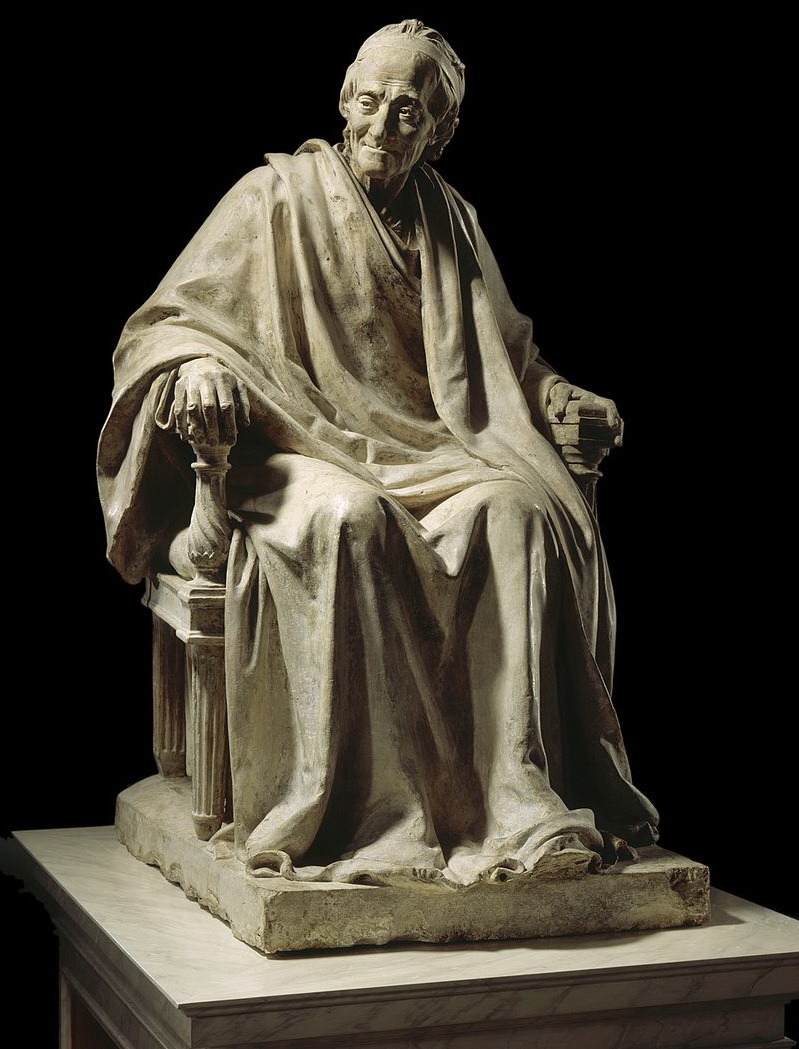
Voltaire Foundation
University of Oxford
Voltaire
was one of the wisest, funniest and cleverest people of the 18th
century. He continues to have lots to teach us about toleration, modesty
and kindness.
- If you like our films, take a look at our shop (we ship worldwide): http://www.theschooloflife.com/shop
- Watch more films on LITERATURE: http://bit.ly/TSOLliterature
- https://www.theschooloflife.com/london
- Voltaire and Enlightenment - In terms of the history of ideas, Voltaire’s single most important achievement was to have helped in the 1730s to introduce the thought of Newton and Locke to France (and so to the rest of the Continent). http://www.voltaire.ox.ac.uk/about-voltaire/voltaire-and-enlightenment
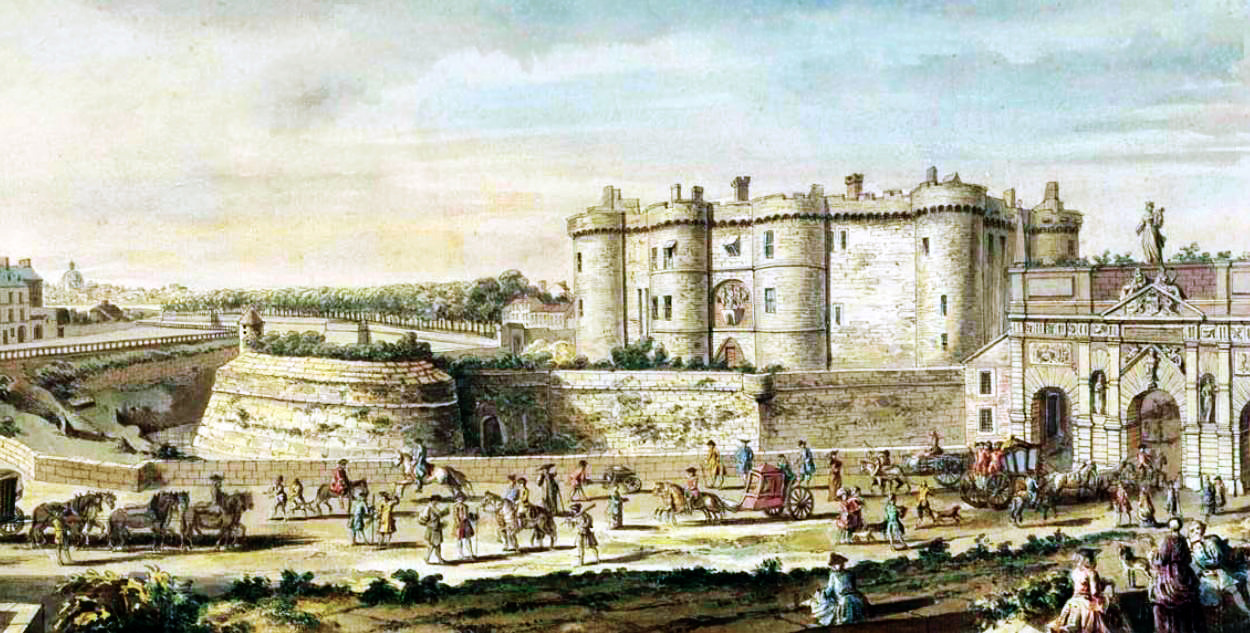
Voltaire was imprisoned in the Bastille from 16 May 1717 to 15 April 1718 in a windowless cell with ten-foot-thick walls
Most of Voltaire's early life revolved around Paris. From early on,
Voltaire had trouble with the authorities for critiques of the
government. As a result, he was twice sentenced to prison and once to
temporary exile to England. One satirical verse, in which Voltaire
accused the Régent of incest with his daughter, resulted in an eleven-month imprisonment in the Bastille. The Comédie-Française had agreed in January 1717 to stage his debut play, Œdipe, and it opened in mid-November 1718, seven months after his release. Its immediate critical and financial success established his reputation. Both the Régent and King George I of Great Britain presented Voltaire with medals as a mark of their appreciation.
He mainly argued for religious tolerance and freedom of thought.
He campaigned to eradicate priestly and aristo-monarchical authority,
and supported a constitutional monarchy that protects people's rights.
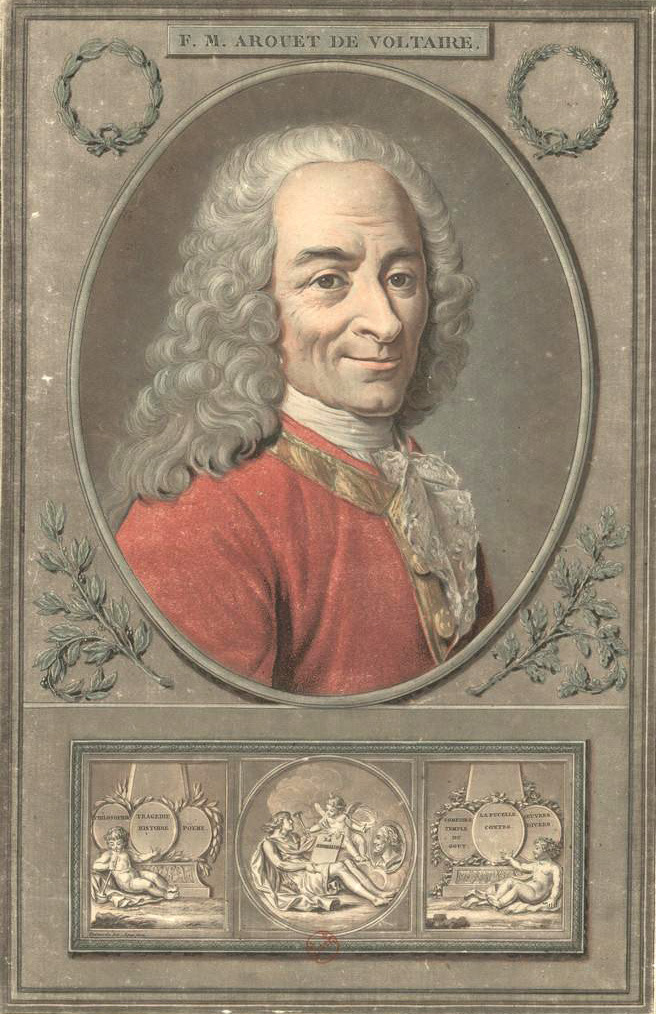
Adopts the name Voltaire
The author adopted the name Voltaire in 1718, following his incarceration at the Bastille. Its origin is unclear. It is an anagram of AROVET LI, the Latinized spelling of his surname, Arouet, and the initial letters of le jeune ("the young"). According to a family tradition among the descendants of his sister, he was known as le petit volontaire ("determined little thing") as a child, and he resurrected a variant of the name in his adult life. The name also reverses the syllables of Airvault, his family's home town in the Poitou region.
Richard Holmes supports the anagrammatic derivation of the name, but adds that a writer such as Voltaire would have intended it to also convey connotations of speed and daring. These come from associations with words such as voltige (acrobatics on a trapeze or horse), volte-face (a spinning about to face one's enemies), and volatile (originally, any winged creature). "Arouet" was not a noble name fit for his growing reputation, especially given that name's resonance with à rouer ("to be beaten up") and roué (a débauché).
In a letter to Jean-Baptiste Rousseau in March 1719, Voltaire concludes by asking that, if Rousseau wishes to send him a return letter, he do so by addressing it to Monsieur de Voltaire. A postscript explains: "J'ai été si malheureux sous le nom d'Arouet que j'en ai pris un autre surtout pour n'être plus confondu avec le poète Roi", (I was so unhappy under the name of Arouet that I have taken another, primarily so as to cease to be confused with the poet Roi.) This probably refers to Adenes le Roi, and the 'oi' diphthong was then pronounced like modern 'ouai', so the similarity to 'Arouet' is clear, and thus, it could well have been part of his rationale. Voltaire is known also to have used at least 178 separate pen names during his lifetime.
The author adopted the name Voltaire in 1718, following his incarceration at the Bastille. Its origin is unclear. It is an anagram of AROVET LI, the Latinized spelling of his surname, Arouet, and the initial letters of le jeune ("the young"). According to a family tradition among the descendants of his sister, he was known as le petit volontaire ("determined little thing") as a child, and he resurrected a variant of the name in his adult life. The name also reverses the syllables of Airvault, his family's home town in the Poitou region.
Richard Holmes supports the anagrammatic derivation of the name, but adds that a writer such as Voltaire would have intended it to also convey connotations of speed and daring. These come from associations with words such as voltige (acrobatics on a trapeze or horse), volte-face (a spinning about to face one's enemies), and volatile (originally, any winged creature). "Arouet" was not a noble name fit for his growing reputation, especially given that name's resonance with à rouer ("to be beaten up") and roué (a débauché).
In a letter to Jean-Baptiste Rousseau in March 1719, Voltaire concludes by asking that, if Rousseau wishes to send him a return letter, he do so by addressing it to Monsieur de Voltaire. A postscript explains: "J'ai été si malheureux sous le nom d'Arouet que j'en ai pris un autre surtout pour n'être plus confondu avec le poète Roi", (I was so unhappy under the name of Arouet that I have taken another, primarily so as to cease to be confused with the poet Roi.) This probably refers to Adenes le Roi, and the 'oi' diphthong was then pronounced like modern 'ouai', so the similarity to 'Arouet' is clear, and thus, it could well have been part of his rationale. Voltaire is known also to have used at least 178 separate pen names during his lifetime.
https://en.wikipedia.org/wiki/Voltaire
Voltaire Nu - par Pigalle
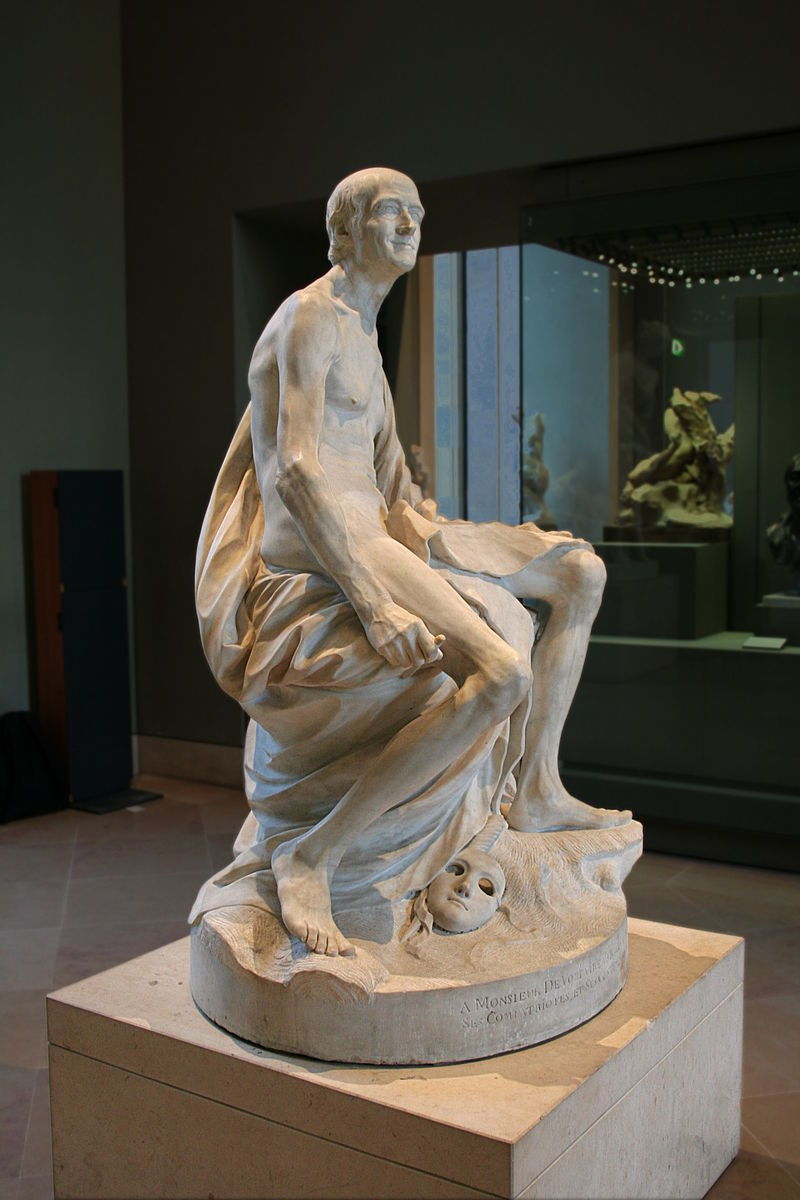
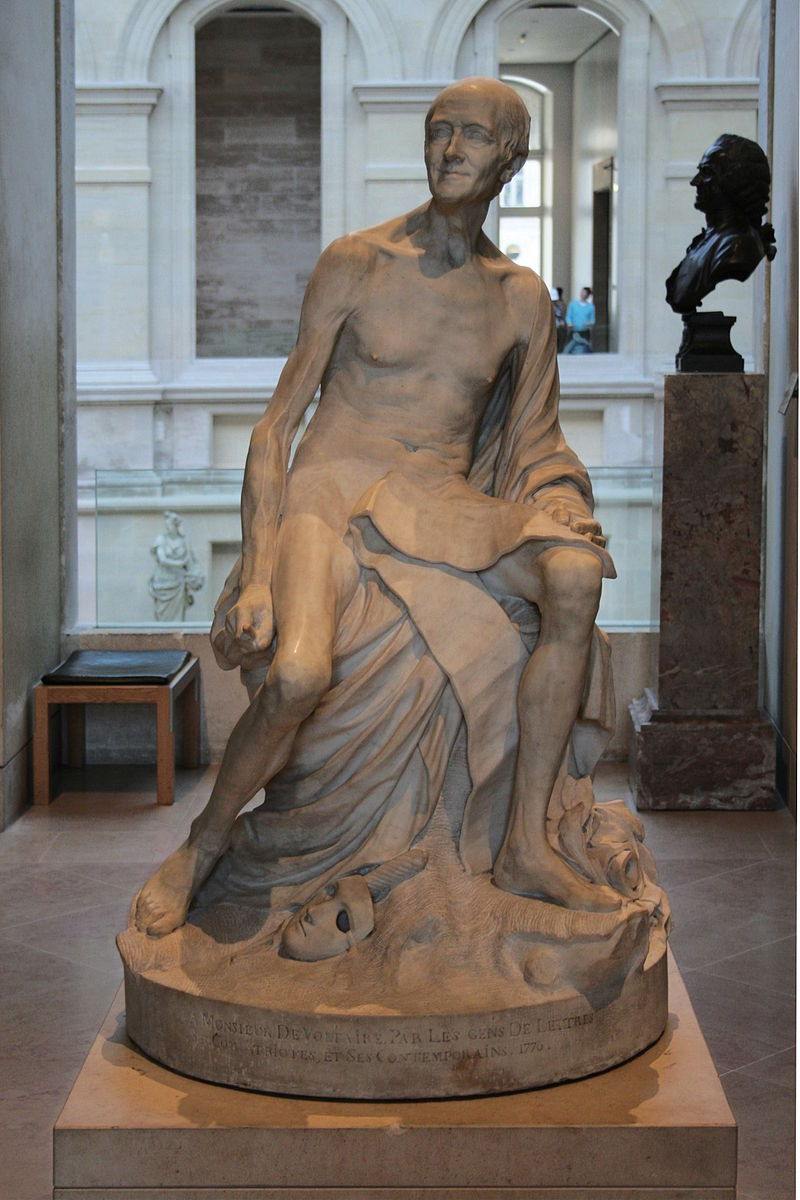
Voltaire Nu - Voltaire Naked
Artist: Jean-Baptiste Pigalle (1714–1785)
Louvre - room 24: Pigalle. Richelieu, ground floor.
Louvre - room 24: Pigalle. Richelieu, ground floor.
En 1770, dans le salon de Mme Necker, une souscription est ouverte pour ériger une statue au grand homme. Pigalle choisit de le représenter en nu héroïque, à l'antique, sans masquer la vérité anatomique d’un corps marqué par l’âge, en magnifiant par contraste la tête pleine d’espérance. L’œuvre, défendue par Diderot, va susciter de nombreuses critiques.
La statue fut réalisée grâce à une souscription lancée par les gens de lettres en 1770. Pigalle, qui avait modelé la tête de Voltaire à Ferney, sculpta le corps décharné d'un vieillard sans souci d'idéalisation. L'écrivain, au départ inquiet du parti-pris esthétique de Pigalle, l'accepta finalement : "Il faut laisser M. Pigalle le maître absolu de la statue ; c'est un crime en fait de beaux-arts de mettre des entraves au génie".
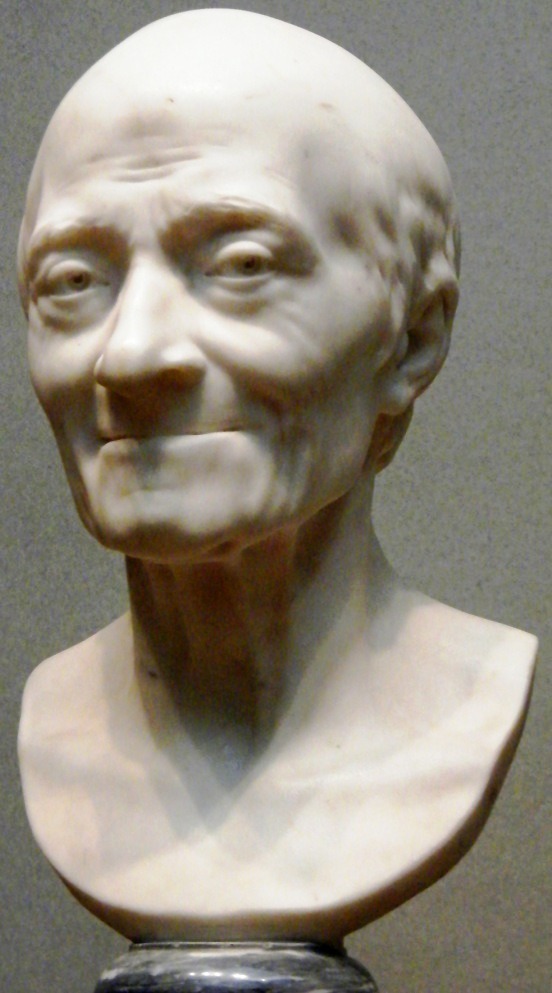
François-Marie Arouet, dit Voltaire, né le 21 novembre 1694 à Paris et mort dans la même ville le (à 83 ans), est un écrivain et philosophe1 français qui a marqué le XVIIIe siècle.
Représentant le plus connu de la philosophie des Lumières, anglomane, féru d'arts et de sciences,
personnage protéiforme et complexe, non dénué de contradictions,
Voltaire domine son époque par la durée de sa vie, l'ampleur de sa
production littéraire et la variété des combats politiques qu'il a
menés. Son influence est décisive sur la bourgeoisie libérale avant la Révolution française et pendant le début du XIXe siècle.
Anticlérical mais déiste, il dénonce dans son Dictionnaire philosophique
le fanatisme religieux de son époque. Sur le plan politique, il est en
faveur d’une monarchie modérée et libérale, éclairée par les
« philosophes ». Mettant sa notoriété au service des victimes de
l’intolérance religieuse ou de l’arbitraire, il prend position dans des
affaires qu’il a rendues célèbres : Jean Calas, Pierre-Paul Sirven, chevalier de La Barre et comte de Lally.
Son œuvre littéraire est riche et variée : son importante production théâtrale, ses longs poèmes épiques, telle La Henriade, et ses œuvres historiques firent de lui l’un des écrivains français les plus célèbres au XVIIIe siècle. Son œuvre comprend aussi des contes, notamment Candide ou l'Optimisme, des Lettres philosophiques, le Dictionnaire philosophique et une correspondance monumentale dont nous connaissons plus de 15 000 lettres sur un total parfois estimé à 40 000.
https://fr.wikipedia.org/wiki/Voltaire#cite_note-78

Who was Voltaire?
Wikipedia audio article
Listening is a more natural way of learning, when compared to reading.
Written language only began at around 3200 BC, but spoken language has
existed long ago.
This is an audio version of the Wikipedia Article: Voltaire
00:00:59 1 Biography
00:04:10 1.1 Name
00:06:10 1.2 Early fiction
00:07:41 1.3 Great Britain
00:11:34 1.4 Château de Cirey
00:16:31 1.5 Prussia
00:19:11 1.6 Geneva and Ferney
00:21:37 1.7 Death and burial
00:23:50 2 Writings
00:23:59 2.1 History
00:27:05 2.2 Poetry
00:28:02 2.3 Prose
00:32:06 2.4 Letters
00:32:52 3 Religious views
00:34:10 3.1 Christianity
00:38:00 3.2 Judaism
00:40:57 3.3 Islam
00:44:27 3.3.1 Drama iMahomet/i
00:46:56 3.4 Hinduism
00:47:39 4 Views on race and slavery
00:50:08 5 Appreciation and influence
00:54:35 6 Voltaire and Rousseau
00:58:19 7 Legacy
01:02:48 8 Chronology
01:02:57 9 Works
01:03:06 9.1 Non-fiction
01:05:23 9.2 Novellas
01:07:07 9.3 Plays
01:08:34 9.4 Collected works
01:09:09 10
Learning by listening is a great way to:
- increases imagination and understanding
- improves your listening skills
- improves your own spoken accent
- learn while on the move
- reduce eye strain
Now learn the vast amount of general knowledge available on Wikipedia through audio (audio article). You could even learn subconsciously by playing the audio while you are sleeping! If you are planning to listen a lot, you could try using a bone conduction headphone, or a standard speaker instead of an earphone.
- increases imagination and understanding
- improves your listening skills
- improves your own spoken accent
- learn while on the move
- reduce eye strain
Now learn the vast amount of general knowledge available on Wikipedia through audio (audio article). You could even learn subconsciously by playing the audio while you are sleeping! If you are planning to listen a lot, you could try using a bone conduction headphone, or a standard speaker instead of an earphone.
You can find other Wikipedia audio articles too at:
You can upload your own Wikipedia articles through:
https://github.com/nodef/wikipedia-tts

SUMMARY
François-Marie Arouet (21 November 1694 –
30 May 1778), known by his nom de plume Voltaire,
was a French Enlightenment writer, historian and philosopher famous for
his wit, his criticism of Christianity, especially the Catholic Church,
and his advocacy of freedom of religion, freedom of speech, and
separation of church and state.
Voltaire was a versatile and prolific writer, producing works in almost
every literary form, including plays, poems, novels, essays and
historical and scientific works. He wrote more than 20,000 letters and
more than 2,000 books and pamphlets. He was an outspoken advocate of
civil liberties, despite the risk this placed him in under the strict
censorship laws of the time. As a satirical polemicist, he frequently
made use of his works to criticize intolerance, religious dogma and the
French institutions of his day.
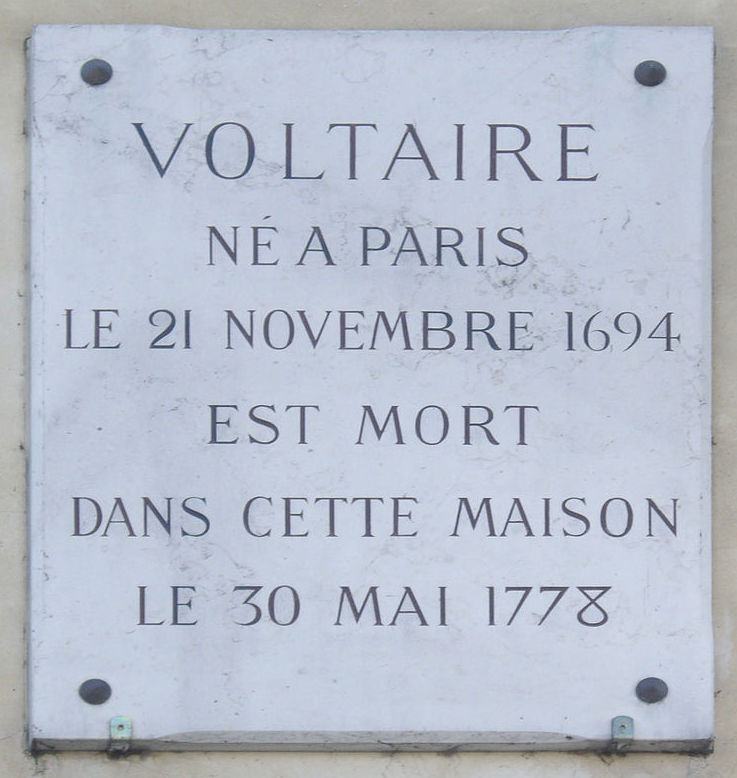
Transfert de Voltaire au Panthéon le 11 juillet 1791
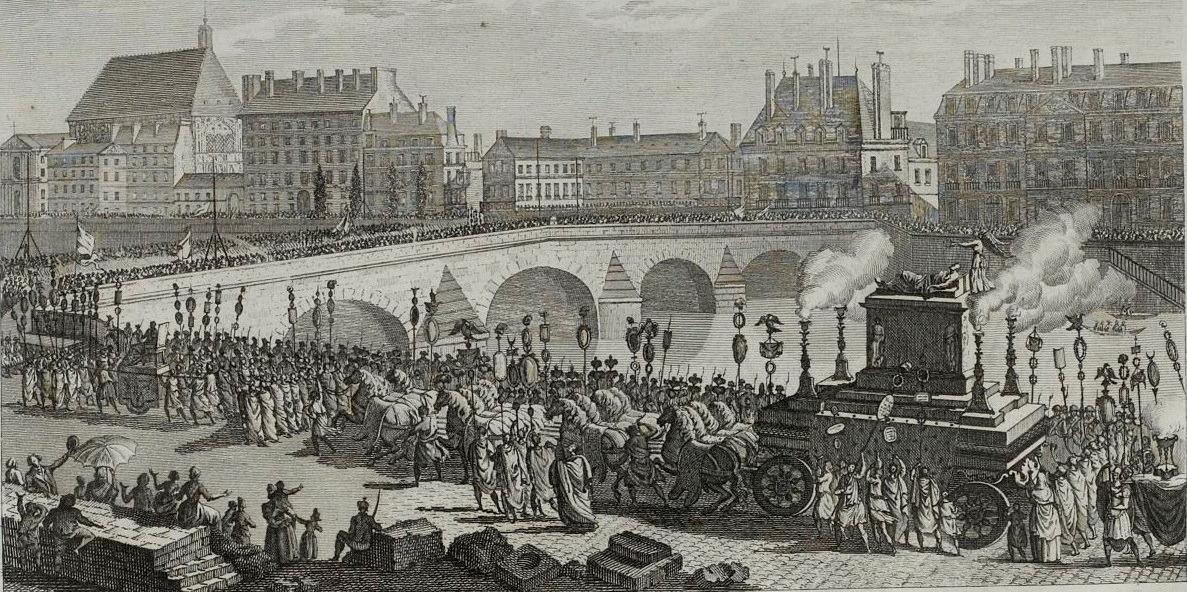

Voltaire’s tomb in the Paris Panthéon
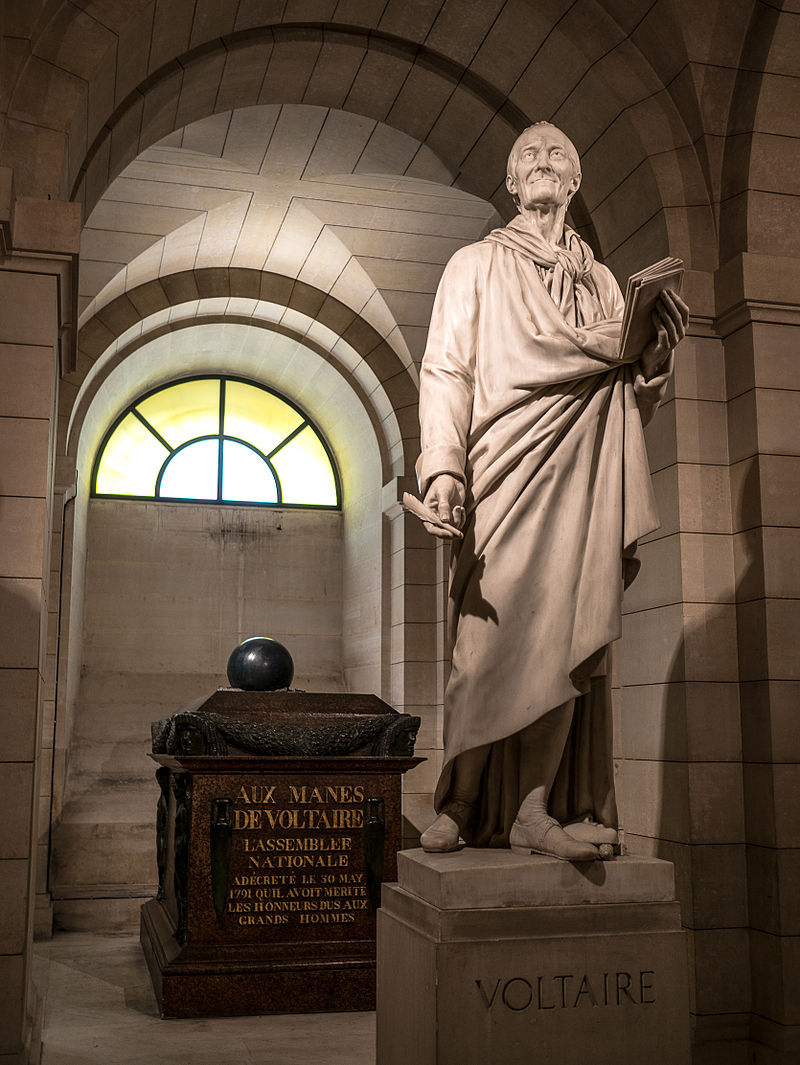
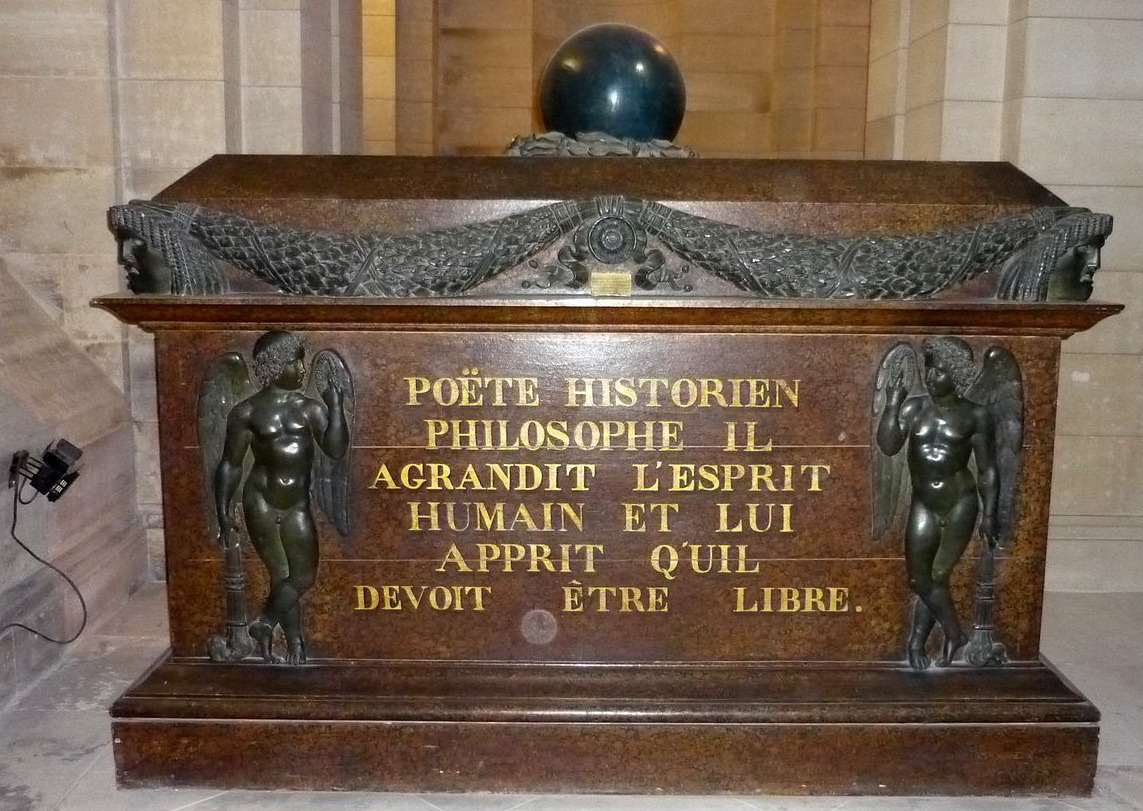

No comments:
Post a Comment